省部共建藏语智能信息处理及应用国家重点实验室系列学术讲座(一)
全校师生:
为营造良好学术氛围,提升我院相关科研团队教学、科研能力,定于2022年7月2日(星期六)以线上线下结合的形式举办举办实验室2022年上半年学术会议(腾讯会议号:488-526-911)。本次讲座由省部共建藏语智能信息处理及应用国家重点实验室主办。现将有关事项通知如下:
报告:Enhance Explainability of Manifold Learning
报告人:韩晓旭 教授,Baylor University
会议时间:2022年7月2日(星期六)上午10:10
会议地点:城西校区理科楼129室
报告摘要:The explainability of manifold learning is rarely investigated though there is an urgent need from both AI theory and practice. In this study, we propose a novel degree of locality preservatio (DLP) approach to study the interpretability of manifold learning. We estimate the DLPs of the state-of-the-art manifold learning methods: t-SNE and UMAP as well as related methods: LLE, HLLE, and LTSA along with widely used PCA across benchmark datasets classified as low-dimensional and high-dimensional data.
Our study provides well-founded explanations of the manifold learning methods in terms of the DLPs. The order of their DLPs follows t-SNE>UMAP>LLE>HLLE/PCA/LTSA, though it may have some exceptions for some high-dimensional data. Both t-SNE and UMAP demonstrate an embedding distance amplification mechanism under the Euclidean distance that forces the latent local data geometry to stand out in dimension reduction. It not only explains why t-SNE and UMAP have higher DLPs than other peers, but also indicates they are not locally isometric under the Euclidean distance. Furthermore, it discovers that t-SNE and UMAP embeddings demonstrate similar nonlinear nature in dimension reduction, besides larger (smaller) data variances for low (high)-dimensional data. To the best of our knowledge, this study is the first work about the explainability of manifold learning. The proposed methods and corresponding results can be also extended to other dimension reduction techniques.
报告人简介:HENRY HAN received the Ph.D. degree from University of Iowa, in 2004. He is currently McCollum Endowed Chair in Data Science and professor of computer science with the Department of Computer in the Rogers College of Engineering and Computer Science at Baylor University. He is also the Director of the Laboratory of Data Science His current research interests include AI, data science, fintech, big data, and cybersecurity. He published more than 90 articles in leading journals and conferences in data science fields. He has been supervising about a total of 70 undergraduate, master and PHD students. His research has been supported by NSF, NIH, and NASA.
